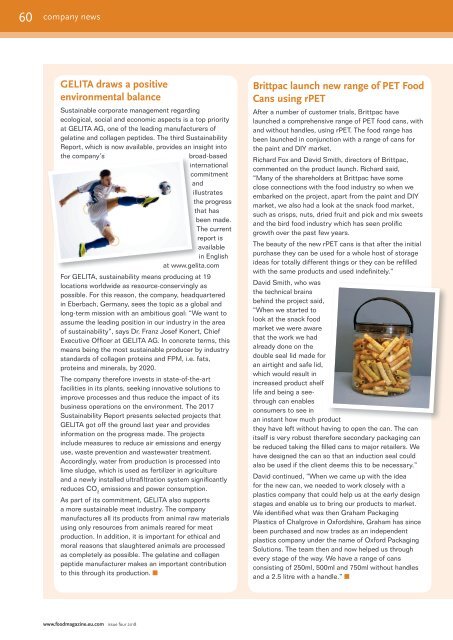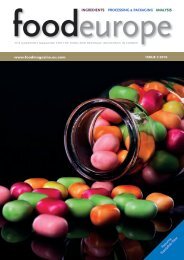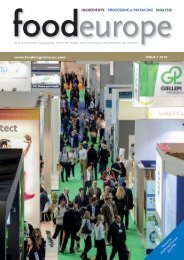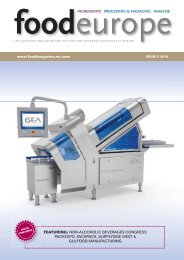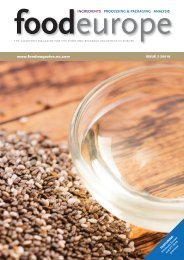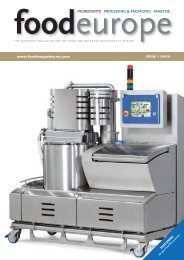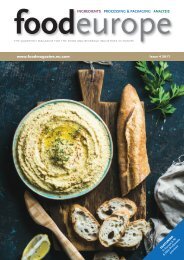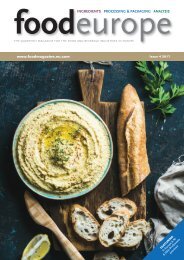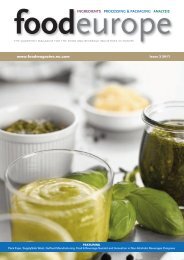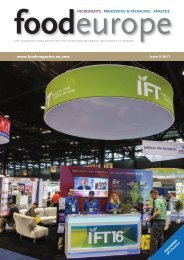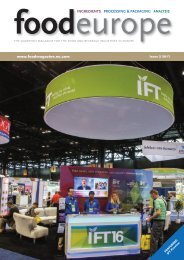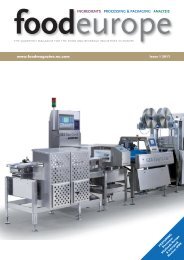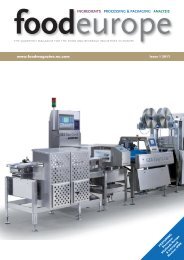Issue 4 2018
You also want an ePaper? Increase the reach of your titles
YUMPU automatically turns print PDFs into web optimized ePapers that Google loves.
60 company news<br />
GELITA draws a positive<br />
environmental balance<br />
Sustainable corporate management regarding<br />
ecological, social and economic aspects is a top priority<br />
at GELITA AG, one of the leading manufacturers of<br />
gelatine and collagen peptides. The third Sustainability<br />
Report, which is now available, provides an insight into<br />
the company’s<br />
broad-based<br />
international<br />
commitment<br />
and<br />
illustrates<br />
the progress<br />
that has<br />
been made.<br />
The current<br />
report is<br />
available<br />
in English<br />
at www.gelita.com<br />
For GELITA, sustainability means producing at 19<br />
locations worldwide as resource-conservingly as<br />
possible. For this reason, the company, headquartered<br />
in Eberbach, Germany, sees the topic as a global and<br />
long-term mission with an ambitious goal: “We want to<br />
assume the leading position in our industry in the area<br />
of sustainability”, says Dr. Franz Josef Konert, Chief<br />
Executive Officer at GELITA AG. In concrete terms, this<br />
means being the most sustainable producer by industry<br />
standards of collagen proteins and FPM, i.e. fats,<br />
proteins and minerals, by 2020.<br />
The company therefore invests in state-of-the-art<br />
facilities in its plants, seeking innovative solutions to<br />
improve processes and thus reduce the impact of its<br />
business operations on the environment. The 2017<br />
Sustainability Report presents selected projects that<br />
GELITA got off the ground last year and provides<br />
information on the progress made. The projects<br />
include measures to reduce air emissions and energy<br />
use, waste prevention and wastewater treatment.<br />
Accordingly, water from production is processed into<br />
lime sludge, which is used as fertilizer in agriculture<br />
and a newly installed ultrafiltration system significantly<br />
reduces CO 2<br />
emissions and power consumption.<br />
As part of its commitment, GELITA also supports<br />
a more sustainable meat industry. The company<br />
manufactures all its products from animal raw materials<br />
using only resources from animals reared for meat<br />
production. In addition, it is important for ethical and<br />
moral reasons that slaughtered animals are processed<br />
as completely as possible. The gelatine and collagen<br />
peptide manufacturer makes an important contribution<br />
to this through its production. n<br />
Brittpac launch new range of PET Food<br />
Cans using rPET<br />
After a number of customer trials, Brittpac have<br />
launched a comprehensive range of PET food cans, with<br />
and without handles, using rPET. The food range has<br />
been launched in conjunction with a range of cans for<br />
the paint and DIY market.<br />
Richard Fox and David Smith, directors of Brittpac,<br />
commented on the product launch. Richard said,<br />
“Many of the shareholders at Brittpac have some<br />
close connections with the food industry so when we<br />
embarked on the project, apart from the paint and DIY<br />
market, we also had a look at the snack food market,<br />
such as crisps, nuts, dried fruit and pick and mix sweets<br />
and the bird food industry which has seen prolific<br />
growth over the past few years.<br />
The beauty of the new rPET cans is that after the initial<br />
purchase they can be used for a whole host of storage<br />
ideas for totally different things or they can be refilled<br />
with the same products and used indefinitely.”<br />
David Smith, who was<br />
the technical brains<br />
behind the project said,<br />
“When we started to<br />
look at the snack food<br />
market we were aware<br />
that the work we had<br />
already done on the<br />
double seal lid made for<br />
an airtight and safe lid,<br />
which would result in<br />
increased product shelf<br />
life and being a seethrough<br />
can enables<br />
consumers to see in<br />
an instant how much product<br />
they have left without having to open the can. The can<br />
itself is very robust therefore secondary packaging can<br />
be reduced taking the filled cans to major retailers. We<br />
have designed the can so that an induction seal could<br />
also be used if the client deems this to be necessary.”<br />
David continued, “When we came up with the idea<br />
for the new can, we needed to work closely with a<br />
plastics company that could help us at the early design<br />
stages and enable us to bring our products to market.<br />
We identified what was then Graham Packaging<br />
Plastics of Chalgrove in Oxfordshire, Graham has since<br />
been purchased and now trades as an independent<br />
plastics company under the name of Oxford Packaging<br />
Solutions. The team then and now helped us through<br />
every stage of the way. We have a range of cans<br />
consisting of 250ml, 500ml and 750ml without handles<br />
and a 2.5 litre with a handle.” n<br />
www.foodmagazine.eu.com issue four <strong>2018</strong>


